General Surgery Residency Program
Find out about the General Surgery Residency Program from our residents and faculty.
Learn more about residencies and fellowships at the University of South Alabama and life on the Gulf Coast.
The General Surgery Residency at the University of South Alabama was established in 1949 which makes this residency the oldest in the State of Alabama. Our training program is fully accredited by the Accreditation Council for Graduate Medical Education (ACGME) and accepts five categorical residents each year. The USA Health University Hospital is an acute care center serving as the major referral center for Southern Alabama, Southern Mississippi and portions of Northwest Florida. The Department of Surgery houses a Level 1 Trauma Center and a Regional Burn Center, as well as a Bariatric Surgery Center, Digestive Health Center, and Cardiovascular Disease Center. Twenty-five percent of the admissions are through the Trauma Center. Of the 100 teaching hospitals nationwide, USA Health University Hospital is 3rd in the acuity index measuring the severity of patient illnesses. Additionally, a recent quality measures report released by the University Health System Consortium (UHC) shows that the University Hospital is ranked No. 1 in quality of care among 158 university teaching hospitals.
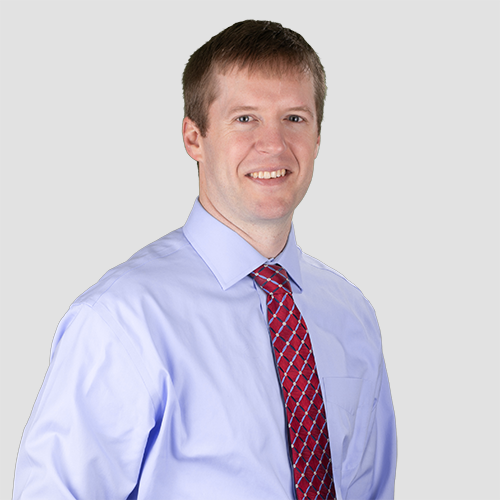
- Lee Grimm, Jr., M.D., FACS, FASCRS
Residency Program Director
Professor
Division of Colon & Rectal Surgery
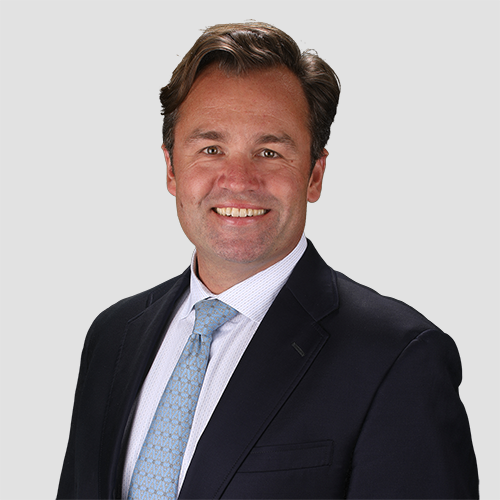
- J. Harrison Howard, M.D., FACS
Associate Program Director
Professor
Surgical Oncologist
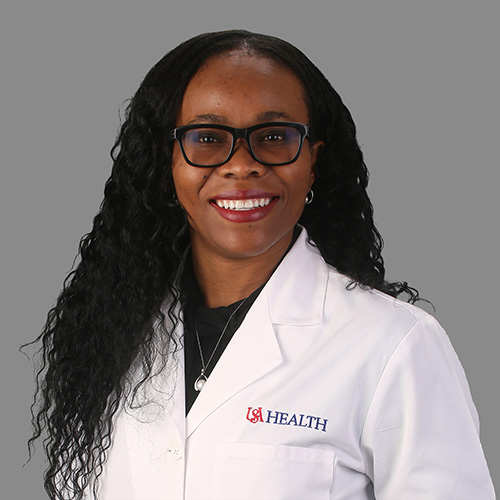
- Maryann Mbaka, M.D., M.B.A., FACS
Associate Program Director
Associate Professor
Trauma
Our residency has undergone a major transformation over the past five years, including the creation of a new educational philosophy and curriculum. In 2011, we instituted a philosophy of “individualized training”. This encompasses the concept that all residents have vastly different backgrounds and future ambitions. Therefore, we attempt to provide the skill-sets that are necessary for each resident to succeed according to individual goals rather than using a generic curriculum. Also, we transitioned from passive learning (i.e. lectures) to an active learning environment which includes weekly basic/clinical science case-based discussions using the SCORE curriculum and frequent “mock-oral” examinations. Simulation laboratories were designed to facilitate acquisition of basic and advanced operative techniques using relevant training methods. For example, we conduct a monthly anatomical cadaveric dissection to enhance operative techniques and better understand anatomical relationships when performing complex operations. Additional more focused courses are annually, including advanced: vascular exposure, trauma, laparoendoscopic, and plastic & reconstructive operative techniques. The culmination of these activities has produced In-Service Training Examination (ABSITE) scores well above the national average and a near 100% first-time pass rate on the Qualifying Examination (written boards).
Finally, we have placed considerable effort into creating a family of residents and faculty that work as a team to provide the best possible patient care. Indeed, we have assembled an excellent cadre of residents from across the country who are intelligent physicians, excellent technical surgeons, and tremendous humanitarians. I hope that you will consider our residency as your future “family” and help us continue the Tradition of Excellence that has always been the defining characteristic of this residency.
On behalf of the entire faculty at University of South Alabama, we look forward to meeting you!
Vision
National and international leadership in innovative clinical service, education, research, advocacy, and humanitarianism in the context of the patient-surgeon relationship.
Mission
In accordance with our sponsoring institution's mission to "help people lead longer, better lives," the principle goal of the University of South Alabama General Surgery Residency Program is to create a family of residents and faculty that work as a team to provide the best possible patient care in a healthy educational and working environment that fosters a diverse group of intelligent physicians, excellent technical surgeons, and tremendous humanitarians capable of becoming physician leaders in this region and beyond.
Program AIMS
- Adequately tailor residency training and prepare graduates for their specific surgical career interests (i.e. academic, community surgery, or a specific surgical subspecialty) while still equipping all with the broad skillsets needed to be a general surgeon, comfortable caring for patients with a high complexity and/or acuity of surgical disease.
- Train the future leaders in surgery that will advance the science of medicine and promote evidence-based medicine in the regions and communities in which they serve.
- Provide a healthy work environment.
Values
- Logos – knowledge, skill, acumen, and advocacy
- Ethos – ethical character and moral behavior
- Pathos – compassion, sympathy, empathy, altruism, and humanitarianism
On all clinical rotations, the care of patients is ultimately the responsibility of the attending surgeon. Nevertheless, the resident physician plays a pivotal role at every level of surgical care. Progressive responsibility with each year of surgical training is provided as experience is gained in surgical decision making. The responsibilities for patient care will be assigned to residents at the discretion of the attending surgeon as deemed appropriate.
Our residents receive exposure to preoperative, operative, and postoperative care for patients in the principal components of general surgery: specifically, diseases of the head and neck, breast, skin and soft tissues, alimentary tract, hepatobiliary system, vascular system, and the endocrine system. Residents also experience the comprehensive management of trauma and emergency operations and surgical critical care. In addition, we will provide clinical experience in cardiothoracic surgery, pediatric surgery, plastic surgery, burn management, surgical endoscopy, urology, otorhinolaryngology, gynecology, surgical oncology, transplant, orthopedics, and anesthesiology.
The core clinical education for the Surgical Residency Program takes place at both the USA Health University Hospital and the USA Health Children's & Women's Hospital. Dedicated academic surgeons provide this educational experience in fully JHACO accredited tertiary centers.
To provide a broader educational experience, rotations away from the university system have been established. These rotations specifically provide experience with "bread and butter" general surgery, peripheral vascular surgery, and surgical oncology as practiced by prominent surgeons engaged in private venues in the Mobile region:
- ACS - Acute Care Surgery - emergency general surgery, trauma and plastic
- General Surgery - elective, urgent, and emergent general surgery and ENT
- GI - Onc - metabolic, endocrine, colorectal, and surgical oncology
- SICU - surgical intensive care unit, with critically ill surgical patients
- BICU - adult intensive care unit for severe burns
- Pediatric Surgery - rotation at Children's and Women's Hospital operating on pediatric patients
- CVT - cardiovascular and thoracic surgery at University Hospital with Cardiovascular Associates
- Spring Hill Hospital - general surgery
- USA Health Digestive Health Center - transplant and endoscopy
- Night Float - evening in-house call coverage for University Hospital
Surgical Simulation Center
The University of South Alabama has provided a multimillion dollar investment into the simulation laboratory at USA Health University Hospital. This center provides state of the art technical simulations of both basic and complex procedures. It provides the novice with skills and muscle memory so that when their first endoscopy or laparoscopy is performed on a living patient, they will have at least practiced these techniques beforehand.
Education of the next generation of surgeons is accomplished best through a multifaceted approach of simulation, didactic opportunities, discussion, hands on experiences and frequent feedback. A major philosophical change in medical education has occurred in the centennial year of the Carnegie Foundations ground-breaking Flexner reports. A new Carnegie Foundation Report on Educating Physicians was released (N Engl J Med 2006;355:1339-44). One major tenet of the report was a call for more "active learning" techniques.
In October 2011, Dean Parmellee MD was invited to the Whiddon College of Medicine to give a conference on one technique of active learning called "Team Based Learning". Many faculty within the department of Surgery attended this conference. The Department of Surgery was also represented for more advanced training on the Team Based Learning collaborative meeting in Florida.
Following this background, we initiated a new philosophy in the deliverance of surgical education. We restructured the design of all conferences to initiate "Active" learning rather than the previous lectures that were passive learning. The previous lectures are now facilitated discussions based on the pathophysiology and management of surgical conditions. These case-based discussions in the basic science conferences are facilitated by a different resident each week. A faculty member with expertise in the area of the topic, along with Dr. Grimm (Program Director), reviews the resident's case-based presentation prior to the conference. The educational chief resident is also required to review the material and develop a multiple choice test for the residents to take following the answer the multiple-choice test. The answers are reviewed immediately to ensure maximal learning potential from the exercise.
Our residents are taught to be aware of the larger context and system of healthcare and in effectively using system resources to provide care that is of optimal value. We plan our program around clinical rotations, research and educational opportunities in order to achieve appropriate skills in these competencies. The University of South Alabama Graduate Program in Surgery is a 5-year educational program which includes experience to all of the specialties and subspecialties of Surgery, with clear goals and objectives for each experience.
Rotations by PGY Level
PGY 1 & 2
The first year emphasizes the physiologic and metabolic. Rotations in the PGY 1 include Acute Care Surgery, Surgical Intensive Care Unit, Colorectal Surgery, General Surgery, Surgical Oncology, Laparoscopic Gastrointestinal, Nights and Burns in one and two months increments.
During the first year (PGY 1), exposure is provided to all aspects of pre- and postoperative care with emphasis on the physiologic and metabolic problems that occur in all surgical patients. Operative experience is acquired through presence in the operating room assisting and performing surgical procedures. There is also extensive experience in the placement and use of invasive monitoring devices. These experiences occur at USA Health University Hospital, a tertiary care hospital with the region’s only Level 1 trauma service, and Regional Burn Unit. During the PGY 1, residents will complete a self-directed, soft tissue skills lab, gastrointestinal stapling lab, and open surgery skills lab.
The second year focuses on endoscopy and development of basic operative skills.
In the second year (PGY 2), in addition to rotations on the Acute Care Surgery Service at the University Hospital. Residents will rotate at the USA Digestive Health Center to obtain extensive experience in transplant and flexible endoscopy. Rotations at University Hospital on the GI service and cardiovascular serve provide ample operative experience as surgeon and first assistant. Each resident also rotates at Children’s and Women’s Hospital on the pediatric surgical service where they develop clinical skills in the pediatric population and add to their case log in less complex pediatric surgical cases. Rotations include Transplant-Endoscopy, GI, Cardio & Thoracic, Night Float, and Pediatric Surgery for 10 weeks.
PGY 3
There is increased responsibility in the third year. Rotations include Colorectal Surgery, General Surgery, Trauma, Pediatric Surgery, and Vascular Surgery. All rotations are for 10 weeks.
In the third year (PGY 3), the resident will again rotate onto the University Hospital's Trauma/Acute Care Surgery, and on the general surgery service when they will increase the complexity of cases performed while acting under the direction of senior level residents. They also return to USA Children's and Women's Hospital Pediatric Surgery Service where the resident will have increased responsibilities both in patient care and in the operating room and serves as the chief resident on the pediatric surgery service. During these rotations, residents will get extensive operating room exposure assisting and performing surgical procedures and experience caring for patients outside of a University based, tertiary care setting. They spend time on the vascular service and on the surgical oncology service.
PGY 4 & 5
Patient care and operating room experience mark the fourth year. Rotations include Colorectal, Trauma, Night Float, Cardo & Thoracic, Elective, and Surgical Oncology. All rotations are 10 weeks.
The emphasis during these rotations is on patient care and operating room experience. The PGY 4 experience will also include senior level rotations on University Hospital's Cardiovascular/thoracic, Acute Care Surgery service and Intensive Care Unit and at USA Health Providence Hospital. Providence Hospital is located 25 minutes from USA Health University Hospital. Our residents will have advanced responsibilities there including the supervision of the junior residents on these services. They also serve as the chief resident on the night float service and supervise the junior level residents and admit trauma and acute surgical patients. At the end of the PGY 4 year, residents will be expected to have met both the case number and defined category requirements for certification by the American Board of Surgery.
The fifth year emphasizes healthcare team leadership and an increased level of operating skill.
In the fifth (PGY 5) or Chief year, residents will again rotate to the University Hospital's laparoscopic GI/oncology service, the colorectal service, general surgery service and endocrine service where the resident will obtain experience as the leader of a complete healthcare team including junior residents, nurse practitioners, medical students, and other personnel in addition to obtaining additional experience in patient care and in the operating room. In the Chief year, residents will obtain extensive experience in administration being responsible for work and vacation schedules for the other residents, and in organizing resident educational activities. Operative cases include increasing complex operations often reserved for fellows in other surgical departments.
The goal of the educational conferences of the USA General Surgery Residency is to provide the opportunity for residents to learn in depth the fundamentals of basic and applied sciences as applied to clinical surgery. Conferences are designed to enhance the residents' knowledge base that one must acquire to be a competent surgeon.
- Tuesday - Burn Management Conference
- Tuesday - Trauma Conference
- Thursday - Tumor Board
- Thursday - Basic Science Conference
- Thursday - Case Conference
- Thursday - Surgical Audit/Quality Improvement Conference
- Friday - Surgical Grand Rounds
- Second Thursday from August through April - Anatomical Dissection Trauma Conference
- Fourth Thursday of each month - Journal club
- Simulation labs held on the last Thursday each month
Journal Club
Time: 5:00 pm - 6:00 pm, Monthly
Location: USA Mastin Bldg. 2nd floor, Room 218 with refreshments
Conference Director: Dr. Grimm and Administrative Chiefs
The topics and articles follow the Selected Readings in General Surgery (SRGS) that is developed and maintained by the American College of Surgeons. Residents of all PGY levels present the articles. Dr. Simmons leads the discussion to facilitate active learning. This journal club format is designed to allow the residents to understand the study-design, statistical analysis, and impact of the manuscript. The assigned resident reviews the article and discusses its impact on our current management of patients within the realm of the topic being discussed. One resident from each PGY level presents an article at each journal club.
Burn Management Conference
Time: 12:00 pm - 1:00 pm, Tuesday Afternoons
Location: USA Health University Hospital, 4th floor, Burn Unit Conference Room
Attendance by residents is mandatory when on the Burn Rotation.
Trauma Conference
Time: 1:00 pm-2:30 pm, Wednesday Afternoons
Location: USA Health University Hospital Board Room
This conference involves the multidisciplinary approach to care for the trauma patients. Representatives that are in attendance to this conference are the Trauma Team (attendings, residents, medical students, nurse practitioners), Social work, Nursing, Orthopedics, Physical therapy, Respiratory therapy, Dietitians, and Trauma registry.
Tumor Board
Time: 1st & 2nd Thursday GENERAL Tumor Board, 12:30 - 1:30 PM
Location: USA Health University Hospital 10th Floor Physician Dining Room
Contact: Ms. Yolanda Topin, USA Health University Hospital 471-7747 (Mon, Thur, Fri), University
Hospital 445-9837 (Tues & Wed)
Basic Science Conference
Time: 3:00 pm - 4:00 pm
Location: Mastin 218
The purpose of the conference is to strengthen the fund of knowledge of surgical residents in preparation for in-service exams and the boards, with an emphasis on interactive learning.
Case Conference
Time: 4:00 pm - 5:00 pm
Location: Mastin 218
Residents present cases from the weekly case-list that is randomly selected by Dr. Grimm or Administrative Chiefs. There are typically 4-5 cases that are randomly selected. Since the cases are randomly chosen, this conference requires -active preparation as the residents are expected to have reviewed all cases in which they were involved over the past week. This also requires the resident to know the associated literature from each case the previous week and be prepared to defend and discuss the management decisions. The resident presents the patient’s symptoms, diagnostic investigations, operative planning/management, and postoperative course. This conference is designed to create an active learning environment which residents learn presentation skills and patient management in a variety of scenarios.
Morbidity and Mortality Conference
Time: 5:00 pm - 6:00pm, Thursday Afternoons
Location: Mastin 218
This conference reviews weekly morbidities and mortalities in the Department of Surgery, with an emphasis on understanding potential pitfalls and preventing future complications.
Surgical Grand Rounds
Time: 7:00 am - 8:00 am, Friday Mornings
Location: USA Health University Hospital Conference Center
Conference Director: Chair, William O. Richards, MD, FACS
This is a formal conference featuring visiting professors, local faculty, as well as Chief Residents on topics of educational value in the training of Surgical Residents.
Simulation Lab Sessions
Time: 1 - 5pm Thursday afternoon Q Month
Location: Whiddon College of Medicine Simlab Conference Center
The simulation program at USA started with a major grant from the USA Foundation. This Foundation is the body that manages the University of South Alabama Endowments. Simulation centers were created as 3 sites and programs instituted for the College of Medicine, College of Nursing, and College of Pharmacology. This is a major commitment on the part of the University. The Department of Surgery has developed targeted programs in basic surgical skills, stapling techniques, basic laparoscopy, advanced laparoscopy, and in surgical anatomy.
Laparoscopic and Open Skills Lab Sessions
We provide multiple skills labs/sessions for all residents in a variety of venues. Each intern class is given a rigorous technical workshop at the beginning of the PGY-1 year. This workshop is provided by the faculty and Administrative Chief Residents.
Plastic surgeons from the McCullough institute of Plastic Surgery to provide a tissue-reconstruction workshop for one day each year to all the residents. This occurs in July or August of each year.
We secure a grant to provide 4 animate labs during every academic year. This will predominantly encompass learning laparoscopic techniques and procedures. However, there are also open skills such as hand-sewn intestinal anastomosis techniques as well. The animate labs are assigned based on resident class. The specific operation performed is determined based on the PGY level of the resident. PGY-1 &2= Laparoscopic Appendectomy & Laparoscopic Cholecystectomy & open Small bowel resection. PGY-3= Laparoscopic Nephrectomy, Splenectomy & Laparoscopic Colectomy. PGY-4&5= Laparoscopic Colectomy, Gastric bypass, Heller Myotomy & Nissen Fundoplication. The goals and objectives of these labs have been written and are accessible on the resident drive and will be integrated into USAonline.
We also provide a laparoscopic skills lab which consists of human cadaver torsos to provide training in laparoscopic colectomy, laparoscopic low anterior resection, and laparoscopic foregut operations. The cadaver labs will also be used to teach open hernia inguinal repair, proper techniques for laparotomy, and open gastric, small bowel and colon operations. There are four of these labs scheduled each calendar year.
We provide an anatomical dissection each month at the Medical School Cadaver Lab. Residents are placed in teams of five people. This begins with a lecture given by the team and is followed by a surgical dissection of the topic on a cadaver. This is video-recorded and also transmitted to University Hospital “live,” so the residents covering the Trauma service are allowed to participate. There is strong faculty support with the lectures and preparation of the cadaver before the actual dissection. This skills lab session is held monthly and is video-recorded so the Night Float Team can watch the dissection.
Competency and skills acquisition is determined through several mechanisms. Laparoscopic skills are accessed through the Fundamental of laparoscopic Surgery testing that we put each resident through. All of the PGY 4-5 residents have passed this fundamental test. In order to measure basic surgical skills the faculty administers a standardized skills test for basic skills in knot tying, and suturing to the residents. This is the ACS/APDS Surgical Skills curriculum for residents – Phase I. In this test the faculty watch the resident perform basic tasks in surgical skills and they are rated on a 5 point scale from (1) Many unnecessary/disorganized movements to (5) Maximum economy of movement and efficiency. These 2 tests are designed to measure competence in the basics of laparoscopic and open surgery. Additionally residents are evaluated during each rotation as to the acquisition of surgical skills.
As a university-based residency program, we believe it is an important part of our mission to train residents who will ultimately discover new knowledge that will improve the care of patients. As such, we wish to provide opportunities for scholarly work in clinical, behavioral and basic science research for all surgical residents. To promote the development of the Surgical Housestaff interested in an academic career, flexible programs for a rewarding research experience are established either at an extramural site or in concert with the Basic Science faculty or Clinical faculty at the University of South Alabama.
Research in clinical outcomes, education, health services, and other areas is compatible with the department's educational goals and will be approved if an appropriate plan is developed by the resident and the proposed mentor.
For those interested in basic science research, two years of dedicated time is recommended. Ideally, basic research should be performed under the mentorship of accomplished investigators with a track record of extramural funding and known mentorship abilities.
The Department of Surgery Center for Clinical Research
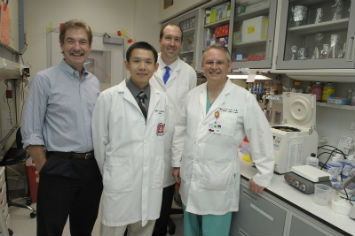 The Department of Surgery actively engages in extramurally funded clinical research.
The vast majority of these endeavors are investigational studies in relation to pharmacotherapy.
The Department of Surgery actively engages in extramurally funded clinical research.
The vast majority of these endeavors are investigational studies in relation to pharmacotherapy.
After completing two years of residency in general surgery at the University of South Alabama's Whiddon College of Medicine, Dr. Larry Lee decided to take a year hiatus from residency training to enhance his education and appreciation for the basic science aspect of clinical care by conducting research with Dr. Mark Gillespie.
Dr. Lee, who investigates multiple organ dysfunction syndrome in trauma patients, was recently awarded first place in the Alabama chapter of the American College of Surgeons (ACS) Residents Poster Competition for his research presentation. Dr. Lee is also the recipient of an American Heart Association postdoctoral fellowship, which funds this research project, along with a grant from the National Institutes of Health (NIH).
For referral of patients into a study, as well as recruitment of study participants, Please contact Mrs. Britt Combs, RN.
Britt Combs, RN
Clinical Research Coordinator
Mastin Building, Room 710
Phone: (251) 471-7988
E-mail: bcombs@health.southalabama.edu
The USA Health University Hospital General Surgery Residency Program accepts applications only via the Electronic Residency Application Service (ERAS) from the Association of American Medical Colleges. All residency positions are offered through the National Residency Matching Program (NRMP).
For our program, a complete file included in the Eras application are the following:
- Dean's Letter aka MSPE
- Medical School transcript
- 3 letters of recommendation
- USMLE or COMLEX scores
- Personal statement
Prior to beginning training, applicants must also:
- Provide Passing Step 1 and Step 2 (both parts) USMLE or COMLEX scores
- Provide Passing Step 3 (for anyone entering at a PGY Level 3 or higher)
- ECFMG Certificate (if applicable)
Frequently Asked Questions
How many residents do you match each year?
We are currently approved for six categorical spots per year. We also currently approved for four preliminary positions.
What about Step 1 and 2?
We require a USMLE Step 1 score of 220 or higher. We only require that you have passed USMLE Step 2 prior to starting the program in July. If you have taken Step 2, we will factor that into our interview selection and overall ranking. We do not have a limitation on the number of attempts for USAMLE exams, but we do take into consideration any failed attempts. Application submission deadline is October 1st.
What does a typical application consist of for those who are invited to interview?
With your USMLE scores, letters of recommendation have the most weight upon the selection process and should include at least one from a general surgeon, preferably from an academic institution. Research, honors in the surgery clerkship, and a strong personal statement are also factors.
Is there a cut off from date of graduation?
We prefer two to five years since graduation from medical school. This will be taken into consideration when reviewing applications.
Is U.S. Clinical Experience required?
We do not require U.S. clinic experience to apply to our program.
Do you invite Foreign Medical Graduates?
We invite strong candidates from foreign medical schools each year.
- We only sponsor J1 Visas sponsored by the Educational Commission for Foreign Medical Graduates (ECFMG)
- USA Health University Hospital does not sponsor H-1B visas for graduates of international medical schools.
- Incoming and continuing J-1 visa house staff are required to obtain their
J-1 visas before their training. Failure to submit the requested documentation will result in a delayed start date. - U.S. clinical experience is highly desirable for any international applicant.
- No more than two to four years out of medical school is highly recommended but not required.
- It is not required for you to have your ECFMG certificate to apply, but you will need this prior to beginning residency training at USA Health University Hospital.
Once an application file is complete and the applicant has met our eligibility criteria, the program evaluates the applicant for an invitation to interview, and invitations are extended through Thalamus to those selected. We will interview approximately 90 candidates.
Interview Dates 2025-2026:
- Tuesday, October 28
- Monday, November 17
- Tuesday, December 2
- Monday, December 15
- Tuesday, January 6
USA General Surgery NRMP Program Number
Categorical General Surgery Residency: 1852440C0
Application Deadline
Our application deadline is October 1st. No exceptions.
Interview Schedule
After several years of virtual recruitment, we are excited to welcome applicants back to our campus. This change allows candidates the opportunity to experience our program and community firsthand, meet our faculty and residents face-to-face, and gain a true sense of the training environment we offer.
You will receive an itinerary 1-2 weeks before your scheduled interview via Thalamus.
What applicants can expect:
Day 1 – Evening dinner reception starts at 7 p.m., CST
- The reception area will be in your welcome email.
- Reception will be casual with the residents, spouses/family, and the Program Director only to have the opportunity to get to know the residents and an outlook on the program from a resident’s perspective.
- Please contact Mrs. Tyronda Rogers if you are unable to attend our dinner reception.
Day 2 – Interview Day
- Interview day will start at 6:30 a.m., CST.
- Attire for Interview Day is Business.
- ALL are expected to arrive at 6:20 a.m. and meet at the hospital’s main entrance lobby area (2451 University Hospital Drive).
- ALL applicants will interview with the Department Chairman, Program Director, Faculty, and Senior Residents. The current residents’ input is valued highly in the selection process.
- ALL applicants will have a total of 5-7 interviews scheduled, depending on the availability of the faculty. There will be lunch with the residents and two hospital tours.
- The interview day will end no later than 3 p.m. CST.
- Interview times are subject to change.
- You may park anywhere in front of the hospital in the visitors’ parking lot. Local hotels in the Mobile area will be provided in your welcome email.
We look forward to meeting each of you in person and sharing why University of South Alabama is a unique and rewarding place to train in surgery.
According to the Whiddon College of Medicine at the University of South Alabama, the following fee structure applies to requests for postgraduate training verification:
- $75.00 - Verification of training dates and/or program completion, program specifics rotations on training including procedures (if available) to be used for credentialing purposes, narratives on resident performance on institution or agency's form with a valid authorization for release information.
Payments can be made online using a credit card.
Payment by check is to be made Payable To:
South Alabama Medical Science Foundation (SAMSF)
Mail to:
University of South Alabama Department of Surgery
ATTN: Tyronda Rogers
2451 University Hospital Drive, Mastin 711
Mobile, AL 36617
Requests submitted without payment will not be processed. Requests are to be specific and must be accompanied by an authorization for release form. If you have questions you may contact the Surgical Education office at (251) 471-7992 or email Cynthia Dennis at cdennis@health.southalabama.edu.
Mailing Address:
USA Health University Hospital
General Surgery Residency Program
2451 University Hospital Dr., Mastin 711
Mobile, AL 36617
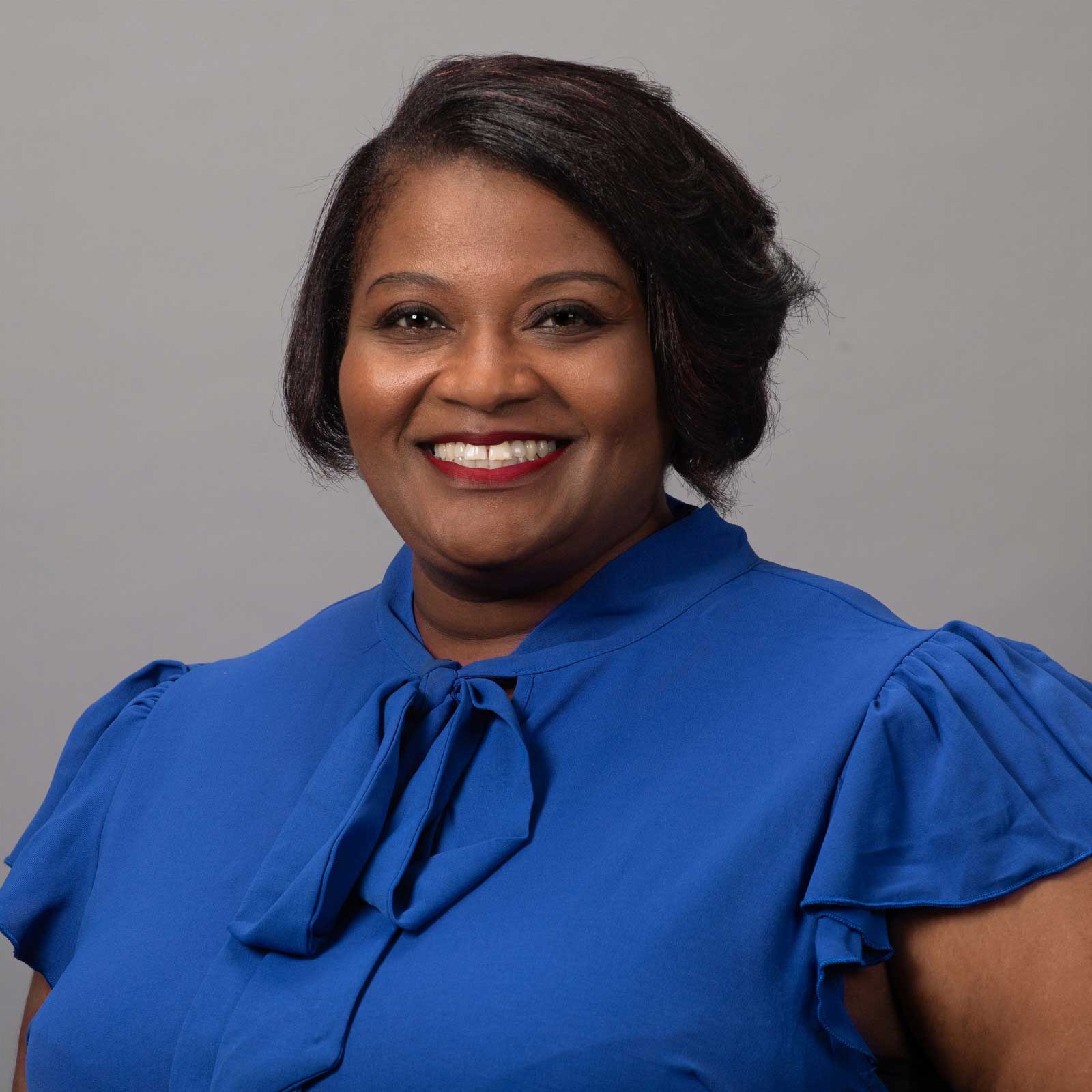
Mrs. Tyronda Rogers
GME Program Coordinator III
University of South Alabama
Phone: (251) 471-7992
Fax: (251) 471-7022
tmrogers@health.southalabama.edu
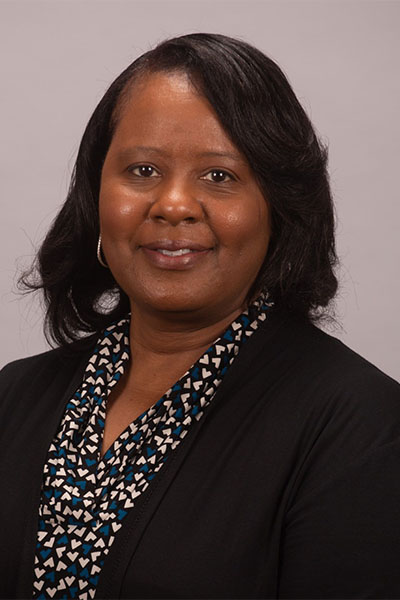
Mrs. Cynthia Dennis
GME Program Coordinator I
University of South Alabama
Phone: (251) 445-8230
Fax: (251) 471-7022
cdennis@health.southalabama.edu
